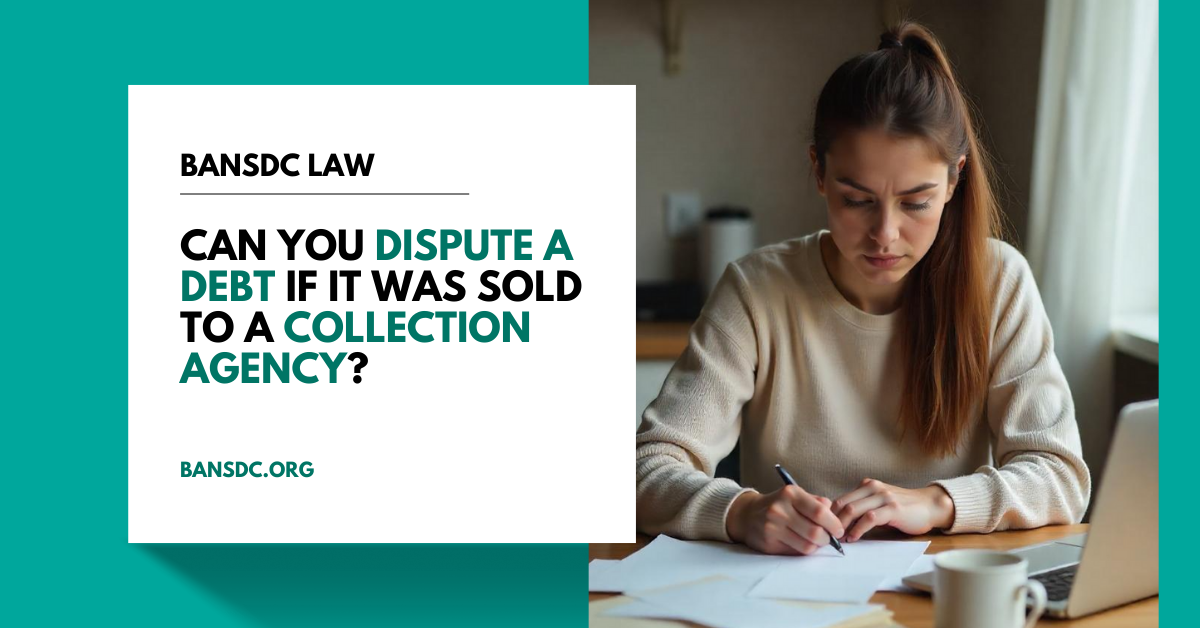Yes—you always retain the right to challenge a debt, even after it changes hands.
Being contacted by a new collector can feel alarming, yet federal law gives you powerful tools to halt harassment, demand proof, and correct mistakes. This page explains how debt sales work, details the protections you keep, and walks you through a dispute from start to finish so you can regain control with confidence.
What Happens When a Debt Is Sold to a Collection Agency?
A debt sale transfers ownership, not obligation.
Original creditors often package past-due accounts and sell them to debt buyers for a fraction of the balance to recover some money quickly. The purchaser then holds the same right to collect the full amount, but the dollar figure and repayment deadline do not change.
Why Creditors Sell Debts
Creditors sell when collection costs outweigh likely recovery.
Specialized agencies have systems—and legal muscle—designed solely to pursue payment, so selling shifts the risk while giving the creditor an immediate, albeit discounted, return.
Your Obligation Remains
Your contractual duty survives the transfer.
The new collector steps into the shoes of the lender, yet every Fair Debt Collection Practices Act (FDCPA) rule still governs its conduct. That means you are protected from threats, false statements, and repeated calls, just as before.
Your Rights to Dispute a Sold Debt
You have an unconditional right to question any debt.
The FDCPA ensures that collectors must verify claims, treat you respectfully, and honor written disputes. Exercising these rights costs nothing and often reveals errors that erase or reduce what you owe.
Key FDCPA Protections
- Right to Verification – Within five days of first contact, the collector must send a debt validation notice listing the creditor, amount, and your 30-day dispute window.
- Right to Cease Collection – When you dispute in writing within 30 days, all collection activity must pause until adequate proof is mailed to you.
- Right to Accurate Reporting – Agencies must promptly update or remove credit-report entries that they cannot verify.
The 30-Day Rule Explained
Acting quickly strengthens your position.
If you dispute within 30 days, the collector is legally barred from phone calls, lawsuits, or credit updates until it proves the claim. You can still dispute afterward, but the agency may continue its efforts while it reviews your letter.
How to Dispute a Debt Sold to Collections (Step-by-Step)
Disputing succeeds when you stay organized and move fast.
1. Verify the Debt Immediately
Request the validation notice if one hasn’t arrived.
A collector that cannot produce it is already violating the FDCPA, giving you leverage.
2. Gather Your Records
Compare the notice to your files.
Look for paid-off balances, double billing, identity-theft accounts, or inflated interest and fees.
3. Draft a Clear Dispute Letter
State plainly that you dispute the debt and why.
Include your name, account number, and concise reasons (“paid in full,” “not my account,” “wrong amount”). Attach copies—never originals—of statements, receipts, or bankruptcy orders.
4. Send the Letter via Certified Mail
Proof of delivery protects you.
Mail the dispute to the collection agency and, if the entry appears on your credit report, to each credit bureau. Keep the green return receipt or electronic confirmation with your records.
5. Pause and Monitor
The agency must stop contact until it verifies.
Mark a calendar for 30 days after delivery; most collectors either respond within that period or cease pursuit entirely when documentation is weak.
6. Review Any Verification Provided
Scrutinize every page the agency sends.
Make sure account numbers match, balances add up, and a legitimate assignment agreement proves ownership. Missing or contradictory records invalidate the claim.
7. Decide Your Next Move
If not verified: Demand deletion of the credit entry and no further contact.
If verified: Choose to pay in full, negotiate a reduced settlement, or set up a payment plan—always in writing and never by phone alone.
After You Dispute: What to Expect
Collectors must verify or abandon the claim.
If the agency cannot prove the debt, it must stop calls, remove credit entries, and leave you alone. Failure to comply opens it to FDCPA liability. If verification arrives, collection resumes, but you now have accurate data to negotiate or defend.
Outcomes When Verification Fails
- Cease Collection – The account is closed and reporting deleted.
- No Response – Silence within 30 days may be grounds for a CFPB or FTC complaint.
- Continued Contact Without Proof – Each call or letter is a potential FDCPA violation, which could entitle you to damages.
Outcomes When Verification Succeeds
- Negotiation Opportunity – Many agencies prefer a lump-sum discount once they know you are informed.
- Possible Lawsuit – If talks stall, some collectors file suit. Verified documentation does not guarantee they will win; defenses like improper assignment or expired statute of limitations may still apply.
Impact on Your Credit Report
Disputing a debt never lowers your score.
The credit bureaus mark the account “in dispute,” a neutral notation removed after resolution. If the debt is deleted, your score often improves; if verified and left unchanged, your score stays where it was before you challenged it.
How Long Collections Stay on Your Report
Most collections remain for seven years from the first missed payment.
Paying them may lessen impact over time, but only deletion removes the negative mark entirely.
Statute of Limitations and Timing
Many debts become time-barred, but collectors may still ask.
Each state sets a window—often three to six years—during which a lender may sue. Once expired, a lawsuit cannot legally proceed, though calls and letters may continue.
Protect Yourself With Age Information
Confirm the date of first delinquency before discussing payment.
In some states, promising to pay or sending even $1 restarts the clock, reviving the collector’s right to sue.
Dispute vs. Settlement
Disputing protects you from paying money you don’t owe.
Challenge accuracy first; negotiate only if the debt proves valid and affordable. Remember, agencies bought your account at a steep discount, but they can still demand full face value unless you secure a written settlement.
When a Settlement Makes Sense
- The debt is valid, verified, and within the statute of limitations.
- You can afford a lump sum that is lower than the claimed balance.
- The agreement includes written confirmation the account will be marked “paid in full” or “settled” with credit bureaus.
When to Seek Legal Help
Consult an attorney when collectors ignore your rights or threaten suit.
A lawyer can enforce the FDCPA, negotiate deeper discounts, defend you in court, and sometimes recover fees and statutory damages from abusive agencies.
Signs You Need Professional Advice
- Repeated calls after a timely dispute letter
- Lawsuit papers or wage-garnishment threats
- Complex issues such as identity theft, mixed files, or multiple collectors claiming the same debt
Frequently Asked Questions
Can I still dispute if the debt was sold years ago?
Yes. The right to demand proof never expires, though the 30-day pause applies only when you act promptly after first notice.
How detailed should my dispute letter be?
Brief and factual—state your dispute, list reasons, request verification, and attach copies of evidence.
What if the collector verifies but I can’t pay?
You can negotiate a reduced lump-sum settlement or a payment plan; get all terms in writing before sending money.
Does disputing stop interest from accruing?
No. Interest may still accrue on a verified debt, but collection efforts must pause until proof is sent.
Will a dispute prevent wage garnishment?
If you dispute within 30 days, the agency cannot lawfully sue until it validates. After validation—or if the dispute was untimely—garnishment is possible only after a court judgment.
Can I negotiate after paying part of the debt?
Yes, but partial payments often reduce leverage. Verify first, then negotiate a comprehensive agreement.
Key Takeaways
You can and should dispute any debt sold to a collection agency when facts don’t add up.
Act within 30 days, keep records, send certified letters, and demand strict proof. A successful dispute ends calls, clears credit reports, and costs nothing. If the debt is valid, informed negotiation or legal counsel can still lead to an affordable resolution. Stay proactive—your rights do not end when a creditor sells your account.

